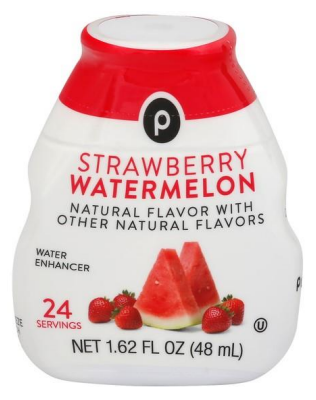Label of Publix Strawberry-Watermelon Water Enhancer Is Misleading, Class Action Alleges
by Erin Shaak
McCall v. Publix Super Markets, Inc.
Filed: March 14, 2022 ◆§ 8:22-cv-00584
A lawsuit alleges the label of a Publix-brand strawberry-watermelon water enhancer misleads consumers into believing the product contains only natural flavors.
Florida
A proposed class action alleges the label of a Publix-brand strawberry-watermelon water enhancer misleads consumers into believing the product contains only artificial flavors.

The 26-page case argues that the front-label statement that Publix Super Market’s strawberry-watermelon water enhancer contains “Natural Flavor With Other Natural Flavors,” which appears in conjunction with images of strawberries and watermelon slices, is false and misleading given the product contains artificial malic acid derived from petroleum. Per the complaint, malic acid is the second most predominant ingredient after water and present in amounts that exceed any “natural flavors” in the product.
According to the suit, federal and state food labeling regulations prohibit “false and deceptive” representations of a food’s characterizing flavors—such as strawberry and watermelon, in this case—and require product labels to disclose whether a characterizing flavor comes from natural or artificial sources.
The lawsuit claims that consumers would not have purchased the Publix water enhancer, or would have paid less for it, had they known it contained artificial malic acid.
The case states that malic acid has two isomers, or arrangements of atoms in the molecule, L-malic acid and D-malic acid. Although L-malic acid occurs naturally in fruits, D-malic acid does not, the suit relays. Per the complaint, the malic acid found in the Publix water enhancer is DL-malic acid, a racemic mixture of the two isomers that is made commercially from petroleum “in a high-pressure, high-temperature, catalytic process.”
The lawsuit alleges that Publix has violated food labeling regulations by stating “malic acid” in the water enhancer’s ingredients list instead of the substance’s more specific name, DL-malic acid.
Moreover, the case argues that the addition of DL-malic acid, which imparts a tart and fruity taste, “fundamentally alters” the chemical makeup of the water enhancer product, such that “the flavor of the Product is no longer a natural ratio of sugar and L-Malic Acid but instead is an artificial ratio of sugar and DL-Malic Acid.” According to the suit, although Publix had the option to use natural flavors such as L-malic acid, natural citric acid or natural strawberry or watermelon flavor, it chose to use artificial DL-malic acid “because it was likely cheaper or more accurately resembled natural flavors than citric acid or other acids.”
The lawsuit contends that consumers are unable to learn that the malic acid in the Publix strawberry watermelon water enhancer is artificial “without a chemistry kit” and were therefore deceived into paying for a product they “did not want or would want less” had they known the truth.
The case looks to represent anyone in Alabama, Florida, Georgia, South Carolina, Tennessee, North Carolina or Virginia who purchased the Publix strawberry-watermelon water enhancer during the relevant statute of limitations period.
Get class action lawsuit news sent to your inbox – sign up for ClassAction.org’s newsletter here.
Video Game Addiction Lawsuits
If your child suffers from video game addiction — including Fortnite addiction or Roblox addiction — you may be able to take legal action. Gamers 18 to 22 may also qualify.
Learn more:Video Game Addiction Lawsuit
Depo-Provera Lawsuits
Anyone who received Depo-Provera or Depo-Provera SubQ injections and has been diagnosed with meningioma, a type of brain tumor, may be able to take legal action.
Read more: Depo-Provera Lawsuit
How Do I Join a Class Action Lawsuit?
Did you know there's usually nothing you need to do to join, sign up for, or add your name to new class action lawsuits when they're initially filed?
Read more here: How Do I Join a Class Action Lawsuit?
Stay Current
Sign Up For
Our Newsletter
New cases and investigations, settlement deadlines, and news straight to your inbox.
Before commenting, please review our comment policy.